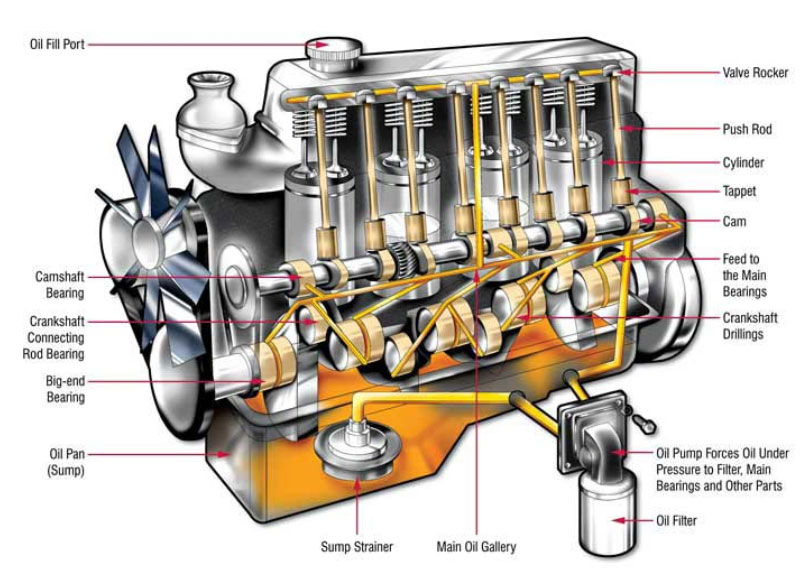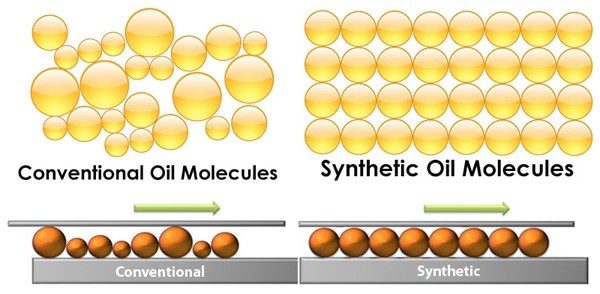
Which is better for your car: synthetic oil or conventional? That depends on what criteria you're looking at. Cost, longevity, performance, and environmental impact are all variables to consider. Here are some of the pros and cons of each type.
Oil basics
 Oil is the lubricant that allows your engine to move at thousands of revolutions per minute without self-destructing. Needless to say, it's crucial to maintain an adequate supply of the correct grade oil for your vehicle. That grade of oil can be either conventional or synthetic in its chemical makeup.
Oil is the lubricant that allows your engine to move at thousands of revolutions per minute without self-destructing. Needless to say, it's crucial to maintain an adequate supply of the correct grade oil for your vehicle. That grade of oil can be either conventional or synthetic in its chemical makeup.
Conventional oil
All conventional oil begins as a base-grade petroleum product. Left to its own devices, base-grade oil is pretty difficult to work with. It's thick and viscous at low temperatures but thin and watery at high temperatures, exactly the opposite of what your vehicle needs. To compensate for this, manufacturers introduce additives that change the properties into something much more useful. A 10-grade base oil with additives may result in a final grade of 10W-20 or even 10W-50 depending on what properties it exhibits.
Unfortunately, conventional oils will start to break down over time due to the tremendous heat and stresses they're subjected to. As it breaks down, it slowly reverts back to the base grade and stops behaving the way you want it to. Now you know why oil changes are so important!
Synthetic oil
 Synthetic oil differs by being chemically structured to match a given oil grade from the start. It can't degrade regardless of how much stress it endures. A 10W-40 synthetic oil will be the same grade after 5,000, 10,000, or, in some cases, even 20,000 miles.
Synthetic oil differs by being chemically structured to match a given oil grade from the start. It can't degrade regardless of how much stress it endures. A 10W-40 synthetic oil will be the same grade after 5,000, 10,000, or, in some cases, even 20,000 miles.
These specialized blends offer significant advantages over conventional oils. Engine parts are protected in extreme weather conditions, sludge and deposits are minimized or eliminated, engine starts are faster, harmful emissions are reduced and intervals between changes are longer. As if that isn't enough, you'll get better gas mileage as well.
Is there a downside?
So we know that synthetic oil lasts longer than conventional oil, doesn't degrade and comes with a laundry list of benefits. How does it compare price-wise?
 The answer is what you already expected: Synthetic oils are more expensive. They sometimes cost as much as twice the price. Conventional oil may be a good deal for someone who needs to save money on a change. After all, paying $19.95 for a conventional oil change versus $89.95 for synthetic is a big difference. But you should also consider that in the long run, synthetic oil offers far more advantages and can last up to three times as long. So even though the up-front cost of synthetic oil is higher, the overall cost is actually lower than conventional.
The answer is what you already expected: Synthetic oils are more expensive. They sometimes cost as much as twice the price. Conventional oil may be a good deal for someone who needs to save money on a change. After all, paying $19.95 for a conventional oil change versus $89.95 for synthetic is a big difference. But you should also consider that in the long run, synthetic oil offers far more advantages and can last up to three times as long. So even though the up-front cost of synthetic oil is higher, the overall cost is actually lower than conventional.
Which oil is greener?
In case you were wondering which type of oil is better for the environment, this is another "it depends" situation. Conventional oil is a petroleum-based product. Synthetic oil is a chemical-based product. Neither is particularly beneficial for the planet, especially if disposed of improperly. However, the longevity of synthetic oil means that far less of it needs to be disposed of in a given time period. It also resists vaporization, which can occur with some conventional oils. This means cleaner exhaust and less waste overall.
If you'd like to learn more about car care, contact Mike Duman Auto Superstore. We're here to help.
